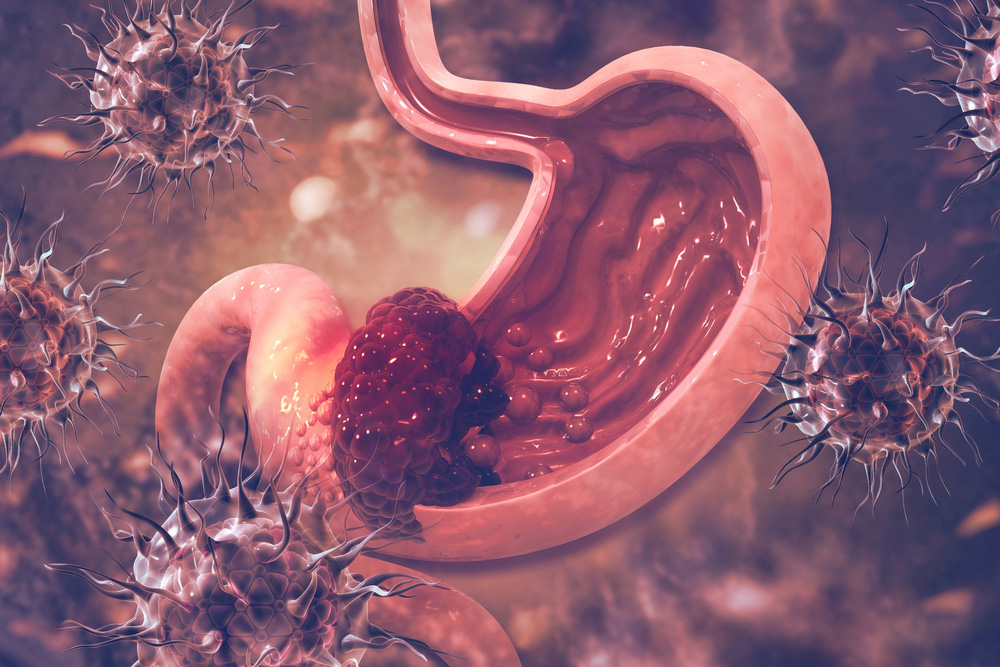Diagnosing stomach cancer early in the disease can make a clear difference in outcome. This form of cancer often develops gradually, and the initial signs are subtle.
Many patients dismiss these changes as common digestive issues, which delays medical evaluation, diagnosis and treatment. Recognizing warning signals is an important step toward getting timely care.
Early Digestive Discomfort
Mild stomach pain and discomfort are frequently overlooked as indicators of serious disease. Patients often attribute occasional bloating, cramping, or indigestion to diet or stress.
Persistent heartburn that does not respond to usual remedies may also signal underlying concerns. Recognizing patterns of discomfort that persist beyond typical digestive upset can guide individuals toward professional assessment.
Unexplained Hunger Loss and Weight Changes
A decrease in appetite or hunger loss without a clear reason may be an early sign of stomach cancer. Patients may unintentionally reduce food intake due to early satiety or a feeling of fullness after eating small amounts.
This often results in gradual weight loss that goes unnoticed over time. Monitoring eating patterns and unexpected changes in body weight can reveal early disease activity.
Nausea and Vomiting Patterns
Recurring nausea or unexplained vomiting can indicate digestive system abnormalities. Vomiting may be infrequent at first but can intensify as the tumor grows.
Some patients notice vomit that contains blood or has a coffee-ground appearance, signaling internal bleeding. Early evaluation helps determine the source of these symptoms and supports targeted treatment plans.
Fatigue and Anemia
Fatigue from anemia is a subtle symptom that often accompanies gastrointestinal malignancies. Blood loss from the tumor can lead to reduced red blood cell counts, resulting in exhaustion, weakness, and pallor.
Patients may notice they tire easily during routine activities or experience shortness of breath with minimal exertion. Recognizing these changes and getting a complete blood count (test) can uncover hidden internal bleeding linked to stomach cancer.
Digestive Irregularities
Chronic indigestion, burping, or bloating may appear benign but can signal early stomach cancer. Altered bowel habits, including constipation or diarrhea, may develop as the digestive system becomes affected.
Patients often report a combination of these symptoms alongside general malaise. Paying attention to persistent irregularities, especially when new or unexplained, can guide timely consultations.
Pain Localization and Intensity
Stomach pain linked to malignancy often presents in the upper abdomen and may radiate to the back. Early discomfort is sometimes intermittent and mild, making it easy to overlook.
As cancer progresses, pain may intensify and interfere with daily activities. Describing pain patterns in detail to a healthcare professional helps with accurate diagnosis and treatment planning.
Heartburn and Reflux Issues
Persistent heartburn that fails to respond to conventional medications can be a warning sign. Tumor growth can interfere with normal stomach function, leading to acid reflux or irritation of the esophagus.
Patients may notice discomfort after meals, a burning sensation in the chest, or a sour taste in the mouth. Tracking the frequency and severity of these episodes aids physicians in distinguishing cancer-related symptoms from common reflux disorders.
Subtle Gastrointestinal Bleeding
Early stomach cancers may cause microscopic bleeding, which often goes unnoticed. Symptoms such as dark or tarry stools, unexplained bruising, or faint streaks of blood in vomit can signal internal bleeding.
Laboratory tests, including stool occult blood analysis, can detect these subtle signs before visible symptoms develop. Recognizing these changes allows for earlier intervention.
Swallowing Difficulties
Difficulty swallowing can emerge if a tumor obstructs the stomach outlet or esophagus. Patients may feel that food becomes stuck or experience discomfort while eating solid foods.
Over time, this can lead to reduced caloric intake and further weight loss. Reporting these symptoms early enables Gastroenterologists to evaluate obstruction and recommend timely interventions.
Feeling Full Quickly
Early satiety, or the sensation of fullness after eating small portions, is a common but often ignored symptom. Patients may instinctively eat less to avoid discomfort, contributing to unintended weight loss.
Monitoring the quantity of food that triggers fullness helps distinguish normal digestive changes from signs of stomach cancer.
Systemic Symptoms
Some patients develop general symptoms that reflect advancing disease. Persistent fatigue, unexplained weakness, or low-grade fever may accompany localized stomach issues.
These systemic changes often prompt patients to investigate their overall health and get diagnostic testing for gastrointestinal conditions.
Recognizing Patterns Over Time
Identifying patterns in stomach cancer symptoms requires attention to frequency, duration, and severity. Patients may notice clusters of digestive discomfort, appetite changes, and fatigue occurring together.
Combining observations of multiple symptoms can prompt earlier medical evaluation. Keeping a symptom diary can be a practical tool for sharing detailed information with healthcare providers.
Risk Factors that Heighten Concern
Certain conditions and lifestyle choices increase the likelihood of developing stomach cancer. Chronic gastritis, H. pylori infection, smoking, and high-salt diets contribute to risk.
Family history of gastrointestinal malignancies may also play a part. Patients with multiple risk factors should maintain vigilance for early symptoms and get prompt assessment if changes occur.
Importance of Timely Diagnosis in New Jersey
For patients experiencing potential warning signs, access to specialized care for gastrointestinal cancer in New Jersey is important. Early evaluation by Gastroenterologists allows for advanced testing, such as endoscopy, imaging, and biopsies.
Local expertise in gastrointestinal cancer detection helps to insure patients receive accurate diagnoses and personalized treatment plans. Prompt action improves outcomes and supports complete digestive health.
Personal Experiences
Many patients describe their own journey with phrases like how I knew I had stomach cancer. Early recognition often stems from noticing persistent, unusual digestive changes that do not improve with routine remedies.
Sharing personal experiences helps others recognize the importance of subtle symptoms and encourages timely medical consultation.
Diagnostic Procedures
Doctors may employ upper endoscopy to visually examine the stomach lining, identify abnormalities, and obtain tissue samples for analysis. Imaging tests, including CT scans, PET scans and MRI, assist in evaluating tumor size and spread.
Laboratory evaluations, including blood tests for anemia, support a complete understanding of patient health. Together, these procedures form an all-inclusive approach to diagnosis and management.
Nutritional and Supportive Care
Patients with early-stage stomach cancer often experience changes in appetite, digestion, and nutrient absorption. Customized nutritional counseling helps maintain strength, manage weight, and reduce discomfort.
Attention to hydration, small frequent meals, and nutrient-dense foods can lessen hunger loss and fatigue. Supportive care also helps with emotional well-being, reducing stress that can exacerbate digestive symptoms.
Treatment Planning
Treatment strategies depend on cancer stage, patient health, and symptom profile. Options may include surgery, chemotherapy, radiation, or targeted therapies.
Collaboration between Gastroenterologists, Oncologists, and dietitians ensures a patient-centered approach. Early recognition of stomach cancer symptoms allows for less invasive interventions and better overall outcomes.
Monitoring and Follow-Up
Ongoing monitoring is necessary after initial diagnosis or treatment. Regular follow-ups include imaging, blood tests, and endoscopic evaluations. Tracking symptom changes helps detect recurrence or complications early.
Patients who are proactive in reporting new stomach pain, appetite changes, or fatigue can benefit from timely adjustments in care.
Recognizing Stomach Cancer Symptoms with Support from the Digestive Health & Nutrition Center
The Digestive Health & Nutrition Center focuses on detecting gastrointestinal malignancies early and managing patients completely. We offer non-invasive evaluations, nutritional counseling, and advanced diagnostic procedures to identify signs of stomach cancer promptly.
Our goal is to support patients through diagnosis, treatment planning, and symptom management with a personal and expert approach.
We combine clinical experience with individualized care to monitor early symptoms such as heartburn, fatigue from anemia, and hunger loss.
Our team treats each patient with attention to their unique condition and lifestyle. By focusing on early recognition and evaluation, we help to reduce delays in diagnosis and improve outcomes for those at risk of gastrointestinal cancer.
If you notice unusual digestive changes or have questions about stomach cancer symptoms, reach out to Dr. Angela Merlo at the Digestive Health & Nutrition Center today. Our team is ready to provide guidance, testing, and support.






